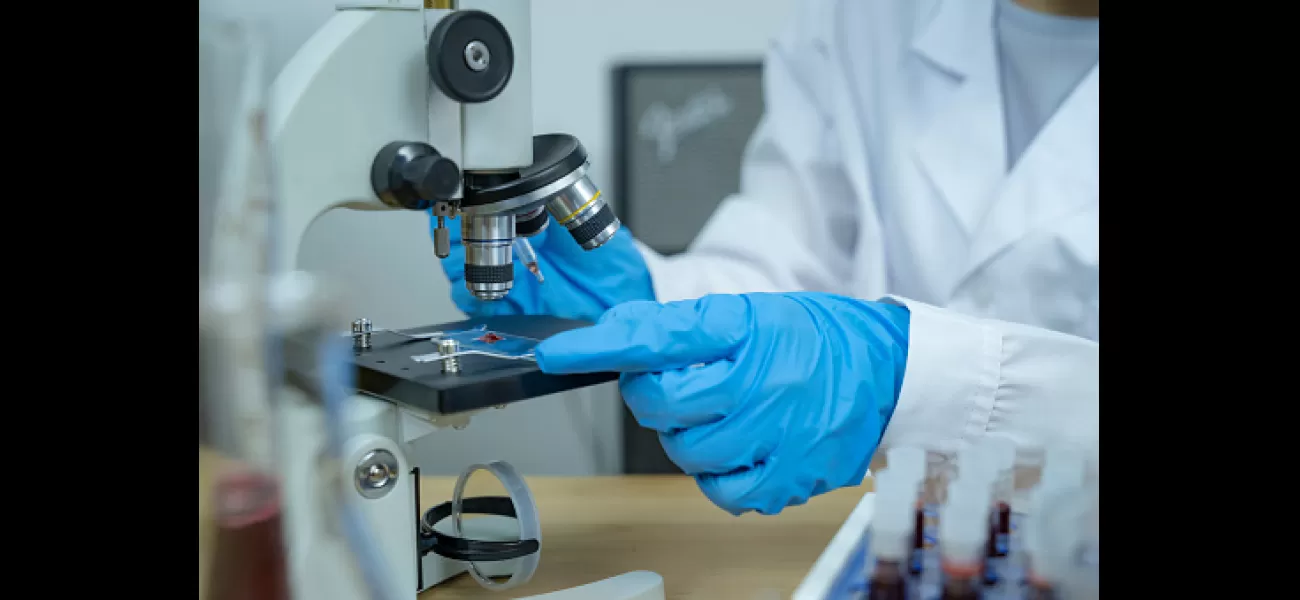Use science, NHS data, and tenant tests to improve appliances.
Reader suggests reviving mammoths will benefit humanity, but timing is uncertain.
March 11th 2024.

One of our readers recently expressed their support for the idea of bringing back the woolly mammoth, stating that it could have beneficial effects for humanity in the future. However, they questioned whether it is ethically justifiable to do so solely for potential benefits. In today's MetroTalk, another reader shares their perspective, pointing out that while we may not see the immediate benefits, they are confident that they will eventually emerge. What do you think about this controversial topic?
Meanwhile, the subject of renaming the National Health Service (NHS) has also been brought up by a reader. They argue that the current data system is too fragmented and unreliable, making the name "national" no longer applicable. In light of our previous discussion about the inadequate private rental market, another reader suggests a new approach to regulating tenants. We would love to hear your thoughts on these topics in the comments section.
The idea of bringing back the woolly mammoth has sparked some interesting discussions in the scientific community. Some experts, like Stephen and Bernard, are questioning the ethics of using genetic engineering to revive a long-extinct species. They mention Colossal Biosciences, a company that is currently editing stem cells from Asian elephants in the hopes of resurrecting woolly mammoths. Stephen argues that with the melting of ice caps, these creatures will have no natural habitat to return to. On the other hand, Bernard believes that our focus should be on protecting existing wildlife that is already under threat.
While some may see this research as pointless, it's important to remember that many of the technologies we rely on today were once thought of as unnecessary. MRI scans, X-rays, mobile phones, and medicines were all the result of scientific discoveries that were initially met with skepticism. Our reader, Philip, believes that the potential benefits of bringing back the mammoth may not be obvious now, but they will undoubtedly emerge in the future.
Moving on to a different topic, our reader Alan shares their frustration with the current state of the NHS. They mention the time and money wasted in emailing medical records between different healthcare providers due to the lack of a cohesive IT system. Alan argues that the NHS is no longer a "national" service, but a collection of individual trusts with their own data controllers. They suggest a simpler, more efficient solution that would benefit both patients and the healthcare system as a whole.
Finally, our reader Simon brings up the issue of social housing and the long waiting lists that often cause problems in the private rental market. They propose a controversial solution - conducting annual assessments of social housing tenants to determine if they are still in need of subsidized housing. This would allow for a more efficient use of resources and potentially reduce strain on the private rental market.
It's clear that there are many complex issues facing society today, and it's important to have open and respectful discussions about them. As always, we encourage our readers to share their thoughts and perspectives in the comments section or by contacting us directly. Let's keep the conversation going.
One of our readers has expressed enthusiasm and support for the idea of bringing back the long-extinct woolly mammoth, stating that it will have positive effects on humanity. However, this raises the question of whether it is ethical to do so simply for our own potential gain in the future. In today's MetroTalk, a reader has written in to share their belief that while we may not see the immediate benefits now, they will surely come in time. What are your thoughts on this controversial topic?
On a different note, there has been a suggestion to rename the National Health Service (NHS) due to its current data system being too scattered and inefficient. This follows our previous discussion on the inadequate private rental market, with another reader proposing a way to hold landlords accountable. We would love to hear your opinions on these issues, so please share your thoughts in the comments below.
Some have questioned whether bringing back the woolly mammoth through genetic engineering is just a frivolous endeavor. However, Stephen and Bernard, two readers, have different perspectives on this. Stephen believes that with the melting of ice caps, these large animals will have no place to call home and thus it is our responsibility to bring them back. On the other hand, Bernard argues that our focus should be on preserving the existing wildlife that is currently under threat. It may seem like a meaningless pursuit, but let's not forget that many of the technologies we rely on today were born from seemingly unnecessary research. MRI scans, X-rays, mobile phones, and medicines are just some examples of the beneficial by-products of scientific advancements. While it may not be clear how bringing back the mammoth will benefit us now, I am confident that it will in the future. - Philip, Via Email.
We want to hear from you, our readers. Share your thoughts by texting VIEWS followed by your comment, name, and location to 65700. Standard network charges apply. You can also email us at mail@ukThe Agency Helpline for Views, Rush-Hour Crush, and Good Deed Feed: 020 3615 0600. Remember, including your name and location with your comment increases the chances of it being published. You can find the full terms and conditions on our website. The Agency is a member of the Independent Press Standards Organisation, and comments may be edited for legal, clarity, or space reasons.
Turning our attention to the NHS, Alan has highlighted the inefficiency and waste of time and resources caused by the lack of a unified IT system. While we may refer to it as the National Health Service, it has become more of a fragmented collection of individual trusts, each with its own data controller. As a veteran of the RAF, I have had to go through a lengthy process of requesting my medical records from multiple sources, including my GP and various hospitals. As someone with a background in computer programming, I am well aware of the issues with insufficiently tested systems and projects that go over budget. It shouldn't be too difficult to design and implement a simple system that can store and access patients' records across the entire health service. Let's keep it simple and avoid unnecessary complications. - Peter Baker, Blind Veteran, Maidstone.
Finally, Tim has suggested that social housing tenants should undergo a yearly means test to ensure they are still in need of government-subsidized housing. Simon Jay agrees with this idea, adding that it would also benefit those in the private rental market by freeing up more properties. He proposes that those who are able to afford the market rate for their housing should have the option to do so, with the extra funds going towards improving social housing. Similarly, if a tenant is unhappy with their current home, they should have the option to move to a more suitable one. This system would ensure that those in need are being supported while also preventing abuse of the system. - Simon Jay, Cambridge.
On a final note, we would like to acknowledge and honor the many Commonwealth soldiers who have been commemorated with their own memorials. These brave men and women have made incredible sacrifices, and it is important that we remember and honor their contributions.
Meanwhile, the subject of renaming the National Health Service (NHS) has also been brought up by a reader. They argue that the current data system is too fragmented and unreliable, making the name "national" no longer applicable. In light of our previous discussion about the inadequate private rental market, another reader suggests a new approach to regulating tenants. We would love to hear your thoughts on these topics in the comments section.
The idea of bringing back the woolly mammoth has sparked some interesting discussions in the scientific community. Some experts, like Stephen and Bernard, are questioning the ethics of using genetic engineering to revive a long-extinct species. They mention Colossal Biosciences, a company that is currently editing stem cells from Asian elephants in the hopes of resurrecting woolly mammoths. Stephen argues that with the melting of ice caps, these creatures will have no natural habitat to return to. On the other hand, Bernard believes that our focus should be on protecting existing wildlife that is already under threat.
While some may see this research as pointless, it's important to remember that many of the technologies we rely on today were once thought of as unnecessary. MRI scans, X-rays, mobile phones, and medicines were all the result of scientific discoveries that were initially met with skepticism. Our reader, Philip, believes that the potential benefits of bringing back the mammoth may not be obvious now, but they will undoubtedly emerge in the future.
Moving on to a different topic, our reader Alan shares their frustration with the current state of the NHS. They mention the time and money wasted in emailing medical records between different healthcare providers due to the lack of a cohesive IT system. Alan argues that the NHS is no longer a "national" service, but a collection of individual trusts with their own data controllers. They suggest a simpler, more efficient solution that would benefit both patients and the healthcare system as a whole.
Finally, our reader Simon brings up the issue of social housing and the long waiting lists that often cause problems in the private rental market. They propose a controversial solution - conducting annual assessments of social housing tenants to determine if they are still in need of subsidized housing. This would allow for a more efficient use of resources and potentially reduce strain on the private rental market.
It's clear that there are many complex issues facing society today, and it's important to have open and respectful discussions about them. As always, we encourage our readers to share their thoughts and perspectives in the comments section or by contacting us directly. Let's keep the conversation going.
One of our readers has expressed enthusiasm and support for the idea of bringing back the long-extinct woolly mammoth, stating that it will have positive effects on humanity. However, this raises the question of whether it is ethical to do so simply for our own potential gain in the future. In today's MetroTalk, a reader has written in to share their belief that while we may not see the immediate benefits now, they will surely come in time. What are your thoughts on this controversial topic?
On a different note, there has been a suggestion to rename the National Health Service (NHS) due to its current data system being too scattered and inefficient. This follows our previous discussion on the inadequate private rental market, with another reader proposing a way to hold landlords accountable. We would love to hear your opinions on these issues, so please share your thoughts in the comments below.
Some have questioned whether bringing back the woolly mammoth through genetic engineering is just a frivolous endeavor. However, Stephen and Bernard, two readers, have different perspectives on this. Stephen believes that with the melting of ice caps, these large animals will have no place to call home and thus it is our responsibility to bring them back. On the other hand, Bernard argues that our focus should be on preserving the existing wildlife that is currently under threat. It may seem like a meaningless pursuit, but let's not forget that many of the technologies we rely on today were born from seemingly unnecessary research. MRI scans, X-rays, mobile phones, and medicines are just some examples of the beneficial by-products of scientific advancements. While it may not be clear how bringing back the mammoth will benefit us now, I am confident that it will in the future. - Philip, Via Email.
We want to hear from you, our readers. Share your thoughts by texting VIEWS followed by your comment, name, and location to 65700. Standard network charges apply. You can also email us at mail@ukThe Agency Helpline for Views, Rush-Hour Crush, and Good Deed Feed: 020 3615 0600. Remember, including your name and location with your comment increases the chances of it being published. You can find the full terms and conditions on our website. The Agency is a member of the Independent Press Standards Organisation, and comments may be edited for legal, clarity, or space reasons.
Turning our attention to the NHS, Alan has highlighted the inefficiency and waste of time and resources caused by the lack of a unified IT system. While we may refer to it as the National Health Service, it has become more of a fragmented collection of individual trusts, each with its own data controller. As a veteran of the RAF, I have had to go through a lengthy process of requesting my medical records from multiple sources, including my GP and various hospitals. As someone with a background in computer programming, I am well aware of the issues with insufficiently tested systems and projects that go over budget. It shouldn't be too difficult to design and implement a simple system that can store and access patients' records across the entire health service. Let's keep it simple and avoid unnecessary complications. - Peter Baker, Blind Veteran, Maidstone.
Finally, Tim has suggested that social housing tenants should undergo a yearly means test to ensure they are still in need of government-subsidized housing. Simon Jay agrees with this idea, adding that it would also benefit those in the private rental market by freeing up more properties. He proposes that those who are able to afford the market rate for their housing should have the option to do so, with the extra funds going towards improving social housing. Similarly, if a tenant is unhappy with their current home, they should have the option to move to a more suitable one. This system would ensure that those in need are being supported while also preventing abuse of the system. - Simon Jay, Cambridge.
On a final note, we would like to acknowledge and honor the many Commonwealth soldiers who have been commemorated with their own memorials. These brave men and women have made incredible sacrifices, and it is important that we remember and honor their contributions.
[This article has been trending online recently and has been generated with AI. Your feed is customized.]
[Generative AI is experimental.]
0
0
Submit Comment





